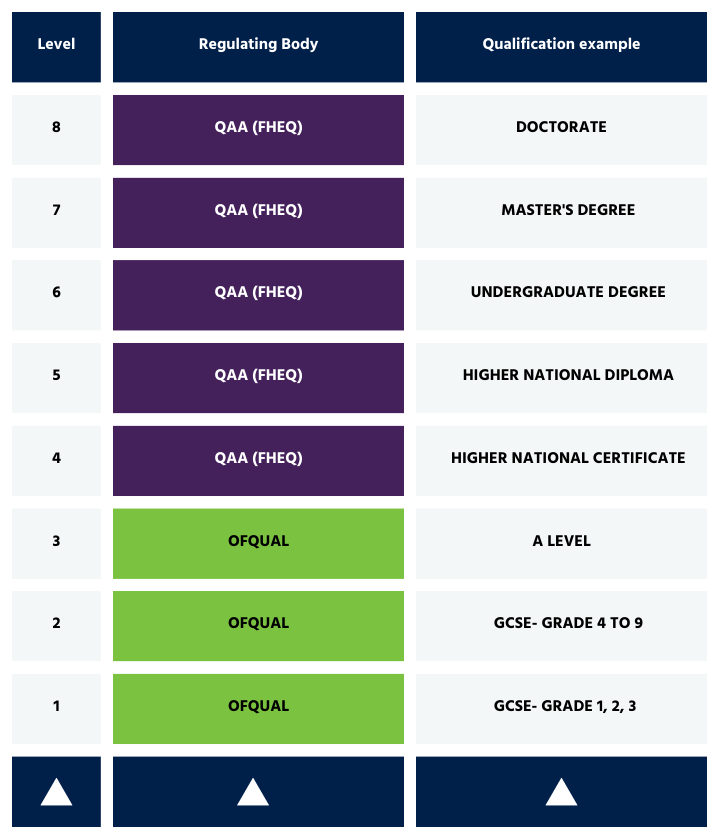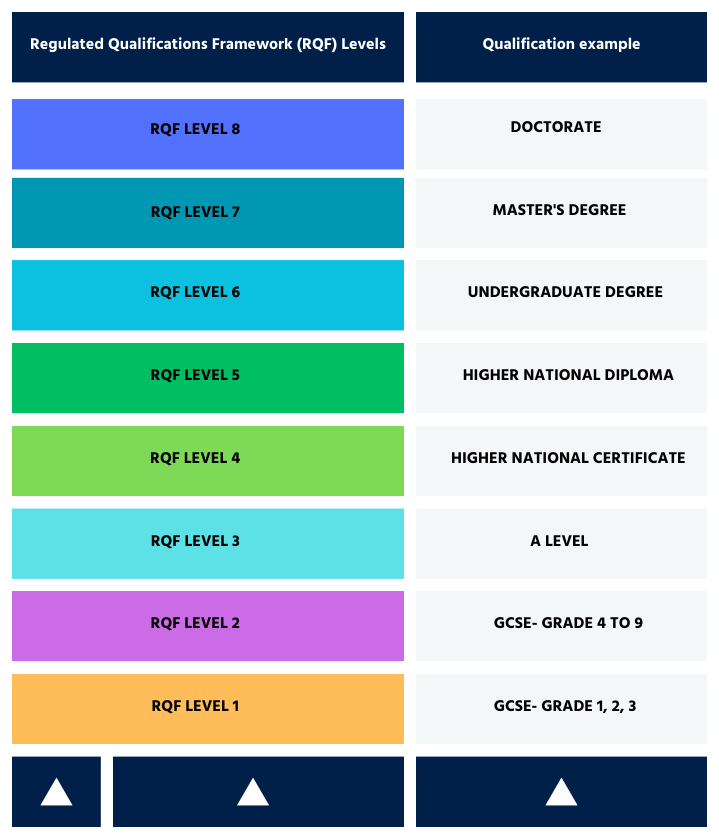The aim of this article is to help prospective students who are thinking about taking an online course from a UK education provider. The information on this page is also equally valid for on-campus, in-person courses in the UK.
What is a Regulated Qualification?
When a qualification is regulated, it means the course has been reviewed and approved by a regulatory body. The review ensures that the programme provides qualified content, teaching methods and learning outcomes and that the assessments are marked objectively and fairly to ensure that the certificate is recognised as a credible and valid achievement in the subject area or industry.
Regulated qualifications are reviewed and assessed over time to ensure they maintain quality and relevance. As a result, individuals taking these courses can have confidence that the knowledge and skills they are acquiring will be recognised by employers and provide a pathway to higher-level study.
Why Is It Important to Take a Regulated Qualification?
Depending on the reason you are studying, taking a regulated course provides guarantees in several areas.
- The certificate is recognised as having academic weight are a specific level.
- The course will provide clear pathway options for further study.
- Employers will recognise and look for employees who hold regulated qualifications.
Who Regulates UK Qualifications?
In the UK, two main bodies regulate qualifications- Ofqual and the QAA.
Qfqual regulates school and colleges qualifications while the QAA regulates university level courses.

Ofqual Regulated Courses
Ofqual regulates school and college qualifications. Ofqual is a non-ministerial UK government body responsible for ensuring that regulated qualifications accurately reflect students’ knowledge and skills.
Qualification regulated by Ofqual
- GCSEs
- A Levels
- AS Levels
- Vocational and Technical Qualifications
- Apprenticeship End-point Assessments
On Ofqual-regulated courses, the certificate will state Ofqual regulated and have the Ofqual logo.
QAA and the Frameworks for Higher Education Qualifications of UK Degree-Awarding Bodies (FHEQ)
For Higher education courses in the UK, it is a little different. The UK government grants degree awarding power to the institution awarding the certificate, and the university works with the QAA to get its courses validated to meet the standards of the FHEQ.
The QAA maintains the FHQE and validates higher-level qualifications to ensure they meet the standards of the FHQE.
When you graduate from a higher education institution with degree-awarding powers, the certificate will not mention the QAA or FHEQ. The final certificate will have the institution’s name and logo with the degree awarding powers.
To recap, for higher education qualifications, the government bestows the degree awarding power to the education provider, and the education provider works with the QAA to ensure its certificates, diplomas, and degrees meet the standards set by the FHEQ.
Regulated University-Level Qualifications
- Doctoral degrees (e.g., PhD/DPhil)
- Master’s degrees (e.g., MA, MSc, MPhil, MLitt)
- Postgraduate Diplomas (PgDip)
- Postgraduate Certificate (PgCert)
- Bachelor’s Degrees (BA, BSc)
- Graduate Diplomas
- Graduate Certificates
- Foundation Degrees (e.g., FdA, FdSc)
- Diplomas of Higher Education (DipHE)
- Higher National Diplomas (HND)
- Higher National Certificates (HNC)
- Certificates of Higher Education (CertHE)
Lastly, UK Universities also offer short courses for professional and personal development. In university terminology, these courses are often called non-credit-bearing. This means the learning outcomes cannot count towards or be used to access regulated qualifications.
The Regulated Qualifications Framework (RQF)
The Regulated Qualifications Framework is a system that provides a way to understand and compare the level and size of different qualifications.
Each level represented a progression in skills, knowledge, and understanding. The RQF allows learners, employers, and educational institutions to understand where a qualification sits in relation to other qualifications and gives a clear overview of progression pathways.

When is it important to take a regulated qualification?
A regulated qualification is a must if you are planning on-
- Gaining a recognised academic qualification
- Planning on taking further study at a higher level
- Applying for a licence to practice in certain professions
- Joining a Professional Body as a graduate member
- Meeting academic requirements for international work and or study.
Taking a non-regulated qualification is suitable for the following situations
- CPD- Continual Professional Development
- Gaining specific skills and knowledge for personal or professional development
- You enjoy the subject and want to learn more about it.
Quality Assurance: Regulated qualifications are developed and monitored according to established standards and guidelines set by regulatory authorities. This ensures that the content, assessment methods, and overall quality of the qualification are consistent and meet specific benchmarks.
Transferability: Regulated qualifications are typically recognised across different regions and countries, making it easier to move between job markets or pursue further education at different universities or in other countries.
Credibility: Regulated qualifications carry more weight and recognition within industries and professions. They are recognised by employers, professional bodies, and educational institutions as evidence of a certain level of knowledge and skill.
How to check if a qualification is regulated?
If your goals require gaining a recognised qualification and you have any doubts about the course you are interested in joining, you can use the following ways to check.
We only list courses from accredited and or regulated UK education providers. You can see the course’s regulations and accreditation on each course we list.
- For levels 1 to 3, the Ofqual Register lists current and past qualifications.
- For Levels 4 to 8, you can check that the awarding institution has degree-awarding powers. We keep an up-to-date list of providers.
Difference between regulated and accredited qualifications
Regulated qualifications meet standardised criteria to ensure that the level, difficulty, and amount of work required to gain the qualification are similar across institutions and are mapped into the Regulated Qualifications Framework (RQF)
Accredited qualifications have the seal of approval from an independent accrediting body, for example, the CMI. The accreditation means that the body recognises the course content and learning outcomes as valuable and aligned with industry best practices.
An independent body can also accredit a regulated qualification. For example, the MSc Data Analytics and Marketing (CIM) from Arden University is accredited by the CMI, and graduates of the course are eligible for CMI membership, and because the course is a regulated qualification, graduates can progress to a master’s degree at a UK university or internationally.
FAQ
Are online courses Recognised UK?
Yes, regulated online courses are recognised in the UK and internationally in precisely the same way as their on-campus equivalents.
How do I know if an online course is legitimate UK?
You can check all regulated courses from UK education providers. If the course is level 1 to 3 on the RQF, check the Qfqual register. For courses at levels 4 to 8, check that the education provider has degree-awarding powers and the QAA has validated the course.
Who regulates online courses?
In the UK, online courses are regulated in exactly the same way as on-campus courses. For levels 1 to 3, Ofqual has a register of regulated courses. The UK government bestows degree-awarding powers at an institutional level for university-level courses.
What is a non-regulated qualification?
A non-regulated qualification is a course that is not benchmarked against the Regulated Qualifications Framework (RQF) and has not been validated by either Ofqual or the QAA.
These courses can be used for professional and personal development, but universities do not recognise them for admissions.
